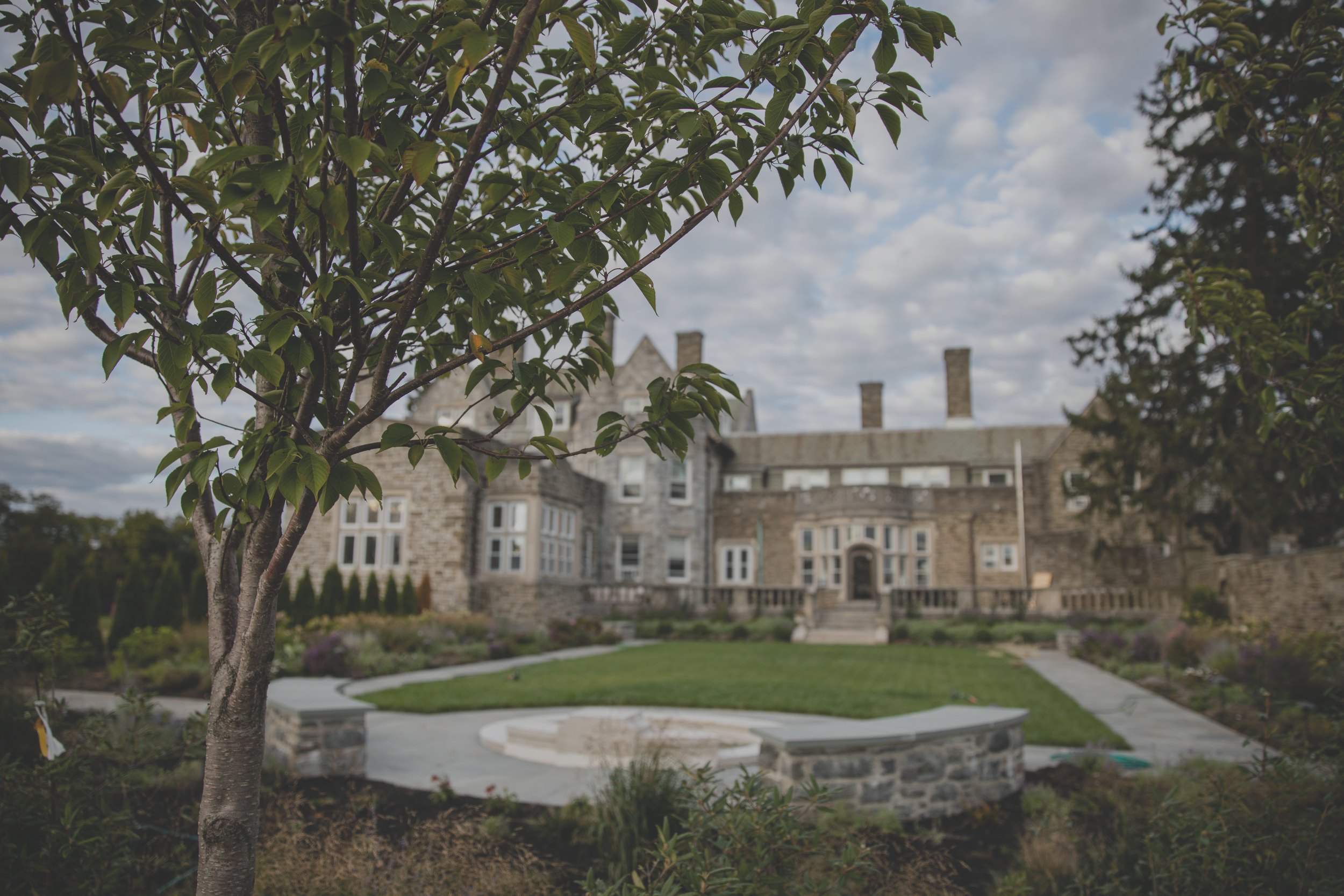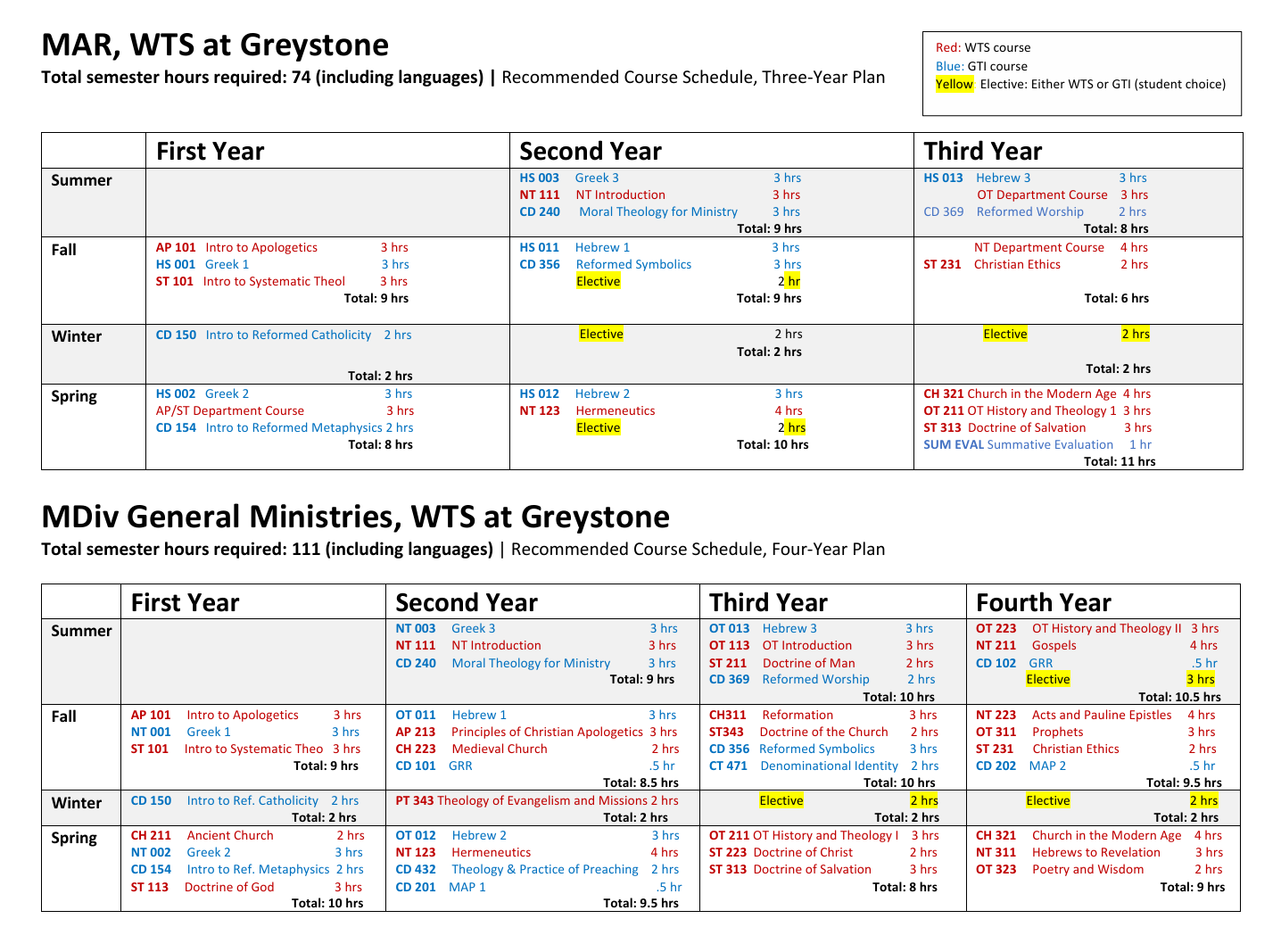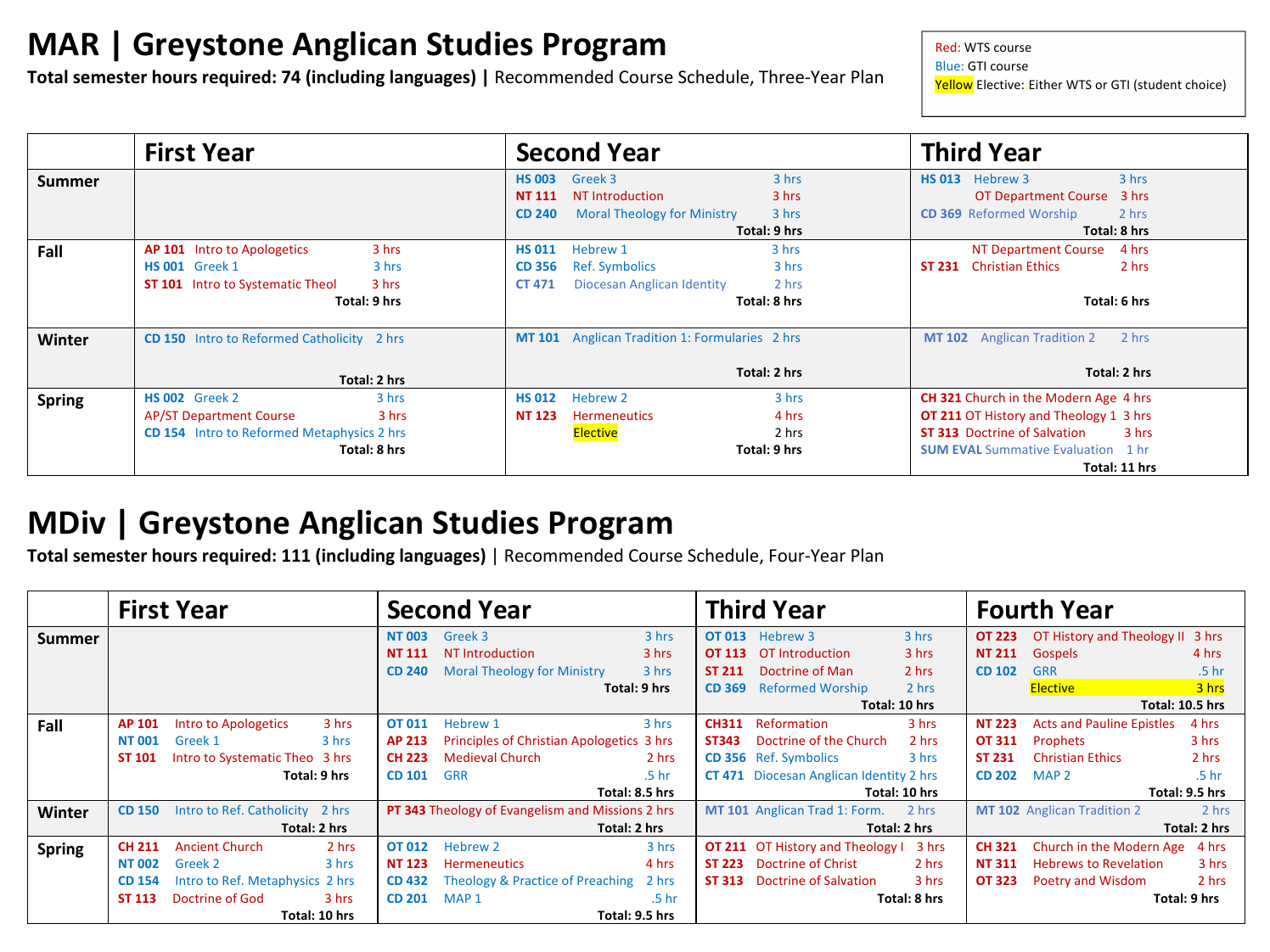
Westminster at Greystone
for ministerial cultivation in and for the Church
Westminster at Greystone
Theological Formation | Online and On Site | Guided Mentorship
Grow where you’re planted–and obtain your degree there too. Greystone Theological Institute is pleased to collaborate with Westminster Theological Seminary for the Master of Arts in Religion (MAR) and Master of Divinity: General Ministry (MDiv). The fully accredited Westminster MAR and MDiv: General Ministries online degrees are offered to students on-site at Greystone Learning Communities across the world. Students at Greystone Learning Communities who pursue these Westminster degree opportunities with Greystone apply a portion of the curriculum with Greystone to their Westminster degree, study under the mentorship of trained Reformed ministers in an apprenticeship model, and complete their entire course of study in an embedded ministry context. Students in this collaboration do not study in an online-only format, but make use of online content delivery in an embedded church context and in an apprenticeship structure. In addition, WTS MDiv: General Ministries or MAR students, not in a Greystone Learning Community, may take up to two (2) Greystone courses as electives.
Prospective students interested in the Greystone collaborative options, as expressed above, and churches interested in becoming a Greystone Leaning Community may find out more information by clicking the links below. Westminster Theological Seminary and Greystone Theological Institute are grateful for this expanded collaboration manifest in these new options available to our students. We pray that the Lord may continue to use both institutions in the formation of faithful servants for Christ and his global Church.

Features
Study in your own Reformed church context
Fully accredited WTS MAR or MDiv
Exclusive to Greystone Learning Community sites
Greystone curriculum integrated with WTS curriculum
Embedded context for mentored formation
Innovative Greystone Practicum approach
Customizable
Free first class (conditions apply)
The Curriculum
Master of Divinity
111 Credit Hours
Master of Arts, Religion
74 Credit Hours
Featuring
Greystone Courses
Greek & Hebrew
Reformed Catholicity
Reformed Metaphysics
Moral Theology for Ministry
Reformed Worship
Reformed Symbolics
…as well as practicums in our innovative Mechanical Arts Program and Greystone Reading Rooms
Course Descriptions
-
This core course module describes and commends confessional Reformed catholicity as a (1) historical reality at work in the period of Reformed confessionlization, (2) biblical requirement, (3) theological foundation, and (4) fraternal mode of church life and practice, including theology. Topics covered include catholicity within Reformed confessional history and practice, the eucharistic origins and context for speech of the Church’s catholicity from Ignatius forward, the Trinity in relation to catholicity, catholicity and eschatology, and catholicity in Reformed worship. Students are trained in the twin virtues of Christian forbearance and courage, and in the wisdom of knowing when each is called for. Students will also learn the practice of sympathetic yet critical discernment in the handling of ideas and proposals outside the bounds of confessional Reformed orthodoxy. Confessional Reformed catholicity is distinguished from historical and contemporary models of “catholicity” that potentially weaken an otherwise robust confessional Reformed identity, theology, and ministry. N.B. This module is the introductory module to material covered at a more advanced level in CD 750/950: Reformed Catholicity.
-
This core course module orients the entire Greystone curriculum as well as matters of life and ministry in terms of a biblical and theological vision of reality. Prompted by the structure of Leviticus in relation to the Pentateuch and the canon of Holy Scripture as a whole, this module considers the real biblical world along the lines of time, space, and vocation and in conversation with various competing metaphysical systems, particularly ancient Near Eastern (especially Babylonian), traditional African, Platonism (traditional and modified), Aristotelian-Thomistic, idealism, and postmodernism. Exploring ordered relations in the biblical world, students will thus learn in detail the nature and importance for the individual, family, and Church of the structural effect of the Sabbath and of Israel’s Levitical festal calendar (time); the various sanctuary realties in Scripture and the biblical teaching on the relationship of the Church to other spatial realities (space); and the special importance of the human person as male or female, alongside the nature and content of human callings in the Church and in the world (vocation). Special attention will be given throughout to the way this biblical framework helps in the interpretation of Scripture and provides perspective on common theological and ecclesiological questions. N.B. This module is the introductory module to material covered at a more advanced level in CD 754/954: The Order of Reality: Time, Space, and Vocation.
-
This course module consists of three parts. The first part examines the way Holy Scripture functions morally, including the nature and proper uses(s) of law (general and special), the Torah as law “collection,” and the ways non-legal biblical genres (historical narrative, poetry, and wisdom) serve as Torah. The second part explores the history, nature, and continued importance of Reformed casuistic pastoral theology against the backdrop of mid- and late-medieval penitential theory and practice, including discussion of the principles and practices of theological reasoning in pastoral contexts in light of biblical examples. The third part carries forward these studies to investigate the uses and abuses of church power, especially in disciplinary contexts, and includes case-study examinations of covenantal apostasy, domestic violence/abuse, and church/home/state relations. N.B. This module is the introductory module to material covered at a more advanced level in CT 740/940: Reformed Casuistry and Moral Theology.
-
This course module provides an overview of the nature, history, principles, and practices of Christian and especially Reformed worship. Topics include the biblical roots and postbiblical history of the Sabbath and Lord’s day; the daily office (prayers); alms and offerings; the centrality of the oral (proclaimed) and visible (sacramental) Word; the regulative, doxological, and dialogical principles of worship; the Trinity in relation to worship; unity and diversity in worship practices; elements and circumstances; the place of song and prayer; and the theological rationale for matters of order and cadence of public worship. Students will gain familiarity with early and medieval Church sample liturgies and the development of Reformation liturgies, the Book of Common Prayer, the Westminster Assembly’s Directory for Public Worship, and select contemporary works on Reformed worship. A special focus throughout is the importance of liturgy in relation to human life and identity, the eschatology of the Church at worship, the witness of the Church to Christ before the world, and as the most regular and ordinary form of pastoral care. N.B. This module is the introductory module to material covered at a more advanced level in CD 769/969: Reformed Liturgics.
-
This course module focuses on the theoretical dimensions of faithful preaching. It thus examines the nature and importance of preaching in Scripture, Church history, the confessional Reformed tradition, and the present context of Church ministry. Special interest will be shown in understanding the Reformed conviction that preaching is a “form” of the Word of God by which God the Father in the Son by the Spirit calls and forms his people for his glory. This module will explore with special interest the relationship of preaching to (1) biblical hermeneutics and to (2) worship. Additional themes include the nature of application and relevance, the preacher himself as a kind of sermon, congregational shepherding through preaching, the conversion and ongoing sanctification of the Christian, and the relationship of the Church to the world, among other topics. Training in preparing and preaching a sermon is included, the exercise of which belongs to Greystone Learning Communities and the oversight of the Directors.
-
This course examines the biblical and historical nature of confession in relation to creeds and the doctrine of the Church, and provides an introduction to and survey of the Westminster Standards (Westminster Confession of Faith; Westminster Larger Catechism; and Westminster Shorter Catechism) and the “Three Forms of Unity” (Belgic Confession; Canons of Dort; and Heidelberg Catechism) in the context of traditional Christian and particularly Reformed symbols.
-
This content of this course depends upon the Reformed denominational relationship that applies to each student and upon that communion’s requirements for ministerial training. Content includes the history, distinctives, or special topics related to that communion. In the event this does not apply to a student, this course may be substituted with an approved elective from other GTI course offerings.
-
God represents himself in his Word as Master Farmer, Gardener, Builder, and the like, and he has called us, as his image bearers, to adopt the mindset of such crafts in relation not only to the material world but to one another. This is especially important for ministers, who are to exhibit faithfulness by drawing upon all the providential sources of wisdom, both “professional” and ordinary. The title “Mechanical Arts” draws directly from Hugh of St. Victor and his proposal for theological pedagogy in his famous Didascalicon (1120s). The “mechanical arts” or artes mechanicae were identified as seven arts (fabric making, armament, commerce, agriculture, hunting, medicine, and theatrics), and positioned as a parallel to the seven liberal arts. It was Hugh who pushed back against the monastic tradition of ignoring the ordinary “mechanical arts” in theological and ministerial formation. Greystone agrees with Hugh, and our efforts reflect that.
Following in the steps of Hugh, Greystone seeks to recover the theological and formative significance of highly skilled ordinary laborers whose work bears a particularly valuable relation to creation and providence and, on those grounds, may provide a source of wisdom to those called to the Church’s ministry today. In Scripture and especially in Proverbs, we are directed to the ordinary skilled laborer and the mundane beauties of creation and providence as sources of wisdom. In our own hurried and harried cultural moment however, this vision exists in unresolvable tension with the inattentive pace of life and the professionalization of knowledge. Today, celebrity figures and their platforms tend to overshadow or even displace the ordinary sources of wisdom with which God in his loving providence has surrounded his people: particular churches, families, friendships, and communities.
-
Key to all Greystone programs is the development of skill, depth, and breadth of reading across the Christian tradition. The Greystone Reading Room is a regular series of micro-course events in which a Greystone Fellow leads a close reading, with explanation and commentary, of an important text of the Christian tradition or of contemporary scholarship. The texts vary widely and change often, but examples of books read include John Swinton, Becoming Friends of Time: Disability, Timefulness, and Gentle Discipleship; Maximos the Confessor, Ambigua; Origen, On First Principles, Athanasius, On the Incarnation, Gregory of Nazianzus, The Five Theological Orations; Augustine, On the Trinity; Geerhardus Vos, The Pauline Eschatology; Basil, Letters; Ephraim Radner, A Time to Keep: Theology, Mortality, and the Shape of a Human Life; the anonymous medieval poem, Pearl; and more.

Join Us in Making Old Ways New
How does a theologian learn how to pursue theology for its own sake and for the good of the Church? What does it take for a man to be fit for pastoral ministry? The Church today has largely been displaced from the theological formation of her leaders who are now often expected to be formed in the classroom alone. But for the Church, from her early days through the confessionalization of the Reformation traditions, such outsourcing would be in tension with her commitments regarding how sanctification and theological formation are connected. At Greystone, we aim to recover the old with the best tools of the new. This looks like a theologically coherent and self-conscious program of embedded church-context mentorship that takes into account the whole person. This is the new old way of theological formation.
“Why should you turn from God when you turn to your books, or feel that you must from your books in order to turn to God? If learning and devotion are as antagonistic as that, then the intellectual life is in itself accursed and there can be no question of a religious life for a student, even of theology.”
- B.B. Warfield
Faithful Reformed churches of various confessional denominational identities may now apply to become Greystone Learning Communities and provide a Greystone “ecclesial ecosystem” for these programs. This means that students wanting rigorous academic training in a context of theological and personal cultivation no longer need to leave the church in which one’s congregational and pastoral roots have been planted. In addition, one can now move to a faithful Reformed church for such study, and thus avoid some of the unmanageable costs ordinarily involved in relocation to another, more expensive city. The enduring importance of the traditional residential seminary model is anchored in precisely these commitments as seminaries like Westminster continue to carry out academically rigorous study in the context of mentorship and surrounded by the irreplaceable resources of a traditional seminary library, residential faculty, and large student body. The Westminster at Greystone Curriculum sits alongside the traditional residential model to provide another option for students not able to pursue residential study and relocation—one which, in its own way, returns the core of theological formation to the context of the Church and not just the classroom. It is learning and devotion, study and prayer, within and for the Church. To ensure that students in the Curriculum receive whole-person formation, theological learning that is devotion, and hands-on service to the Church, every student is required to connect to a Greystone Learning Community where they will be mentored, trained, and guided in their work for the Lord Jesus Christ and his Church. This is how Greystone is humbly yet boldly working to make old ways made new.
Greystone Learning Communities
Connect with an existing Learning Community by clicking on their link and filling out the contact form on their page.
FAQs
Greystone and Westminster
-
Westminster grants the fully accredited degree. Greystone does not presently grant degrees, but an official Greystone Certificate will be sent to you to indicate your successful completion of the Greystone collaborative program.
-
All prospective students must first apply to Greystone. If the applicant is successful with Greystone, the applicant then applies with Westminster whose admissions decisions are final. Greystone admits all students admitted by Westminster. Start your application with Greystone here.
-
Yes, under certain conditions. Please contact Westminster with your inquiry and they will be happy to answer your question.
-
You may take up to two classes in the collaborative program before connecting to a Greystone Learning Community (GLC). You will not be permitted to register for a third class if you are not yet connected to a GLC. All students in the Greystone-Westminster MAR and MDiv programs must be connected to a recognized GLC.
-
Yes, under most conditions. Please contact Greystone with your inquiry and either Greystone or Westminster will be happy to walk you through the process.
-
Taking Classes
-
You may apply through Greystone at any time of the year and you may start the program at any of three start dates during the year: Fall, Spring, and Summer.
-
There are four academic terms per year, which means the programs run year-round.
-
Both the MAR and the MDiv feature elective class options. In both programs the student may choose from either Greystone or Westminster course offerings to satisfy elective course requirements, with the exception that in the MDiv at least one of the electives must be selected from the Westminster Practical Theology (PT) course offerings.
Financial
-
The tuition rate for both programs is $675 per credit hour. The cost will therefore vary depending on the number of credit hours for each class, and the number of classes taken per term and per year.
-
Select Greystone Learning Communities offer tuition and other assistance to students who study at their site. This aid may include partial or full tuition assistance, housing assistance, general maintenance support, or some combination thereof. Contact the GLCs for information regarding this support. Greystone is also pleased to offer a payment plan for outstanding tuition fees. We are also working on establishing other scholarship options. Students interested in student loan options should contact Westminster for information.
-
Tuition for all Greystone classes is paid directly to Greystone. Tuition for all Westminster classes is paid directly to Westminster. You will be invoiced separately by both institutions.
-
All students pay $70 per term for Library Services no matter how many classes the student takes (with a minimum of one class). This fee helps offset library costs as well as provides the student a limited amount of research assistance. All students also pay $18 per month for a Greystone Membership which provides various benefits, including unlimited access to all content at the Greystone Connect online course library, which students will need to access for some of their course requirements.
Greystone Learning Communities
-
You may first communicate your interest with a Greystone Learning Community by contacting that GLC directly using the contact form at the GLC’s webpage. Alternatively, you may contact Greystone by emailing us at info@greystoneinstitute.org and we will advise you based on what we learn about your situation.
-
Contact the listed Greystone Learning Community Director or Contact Person for information and assistance related to moving to their site.
-
Yes.
-
Explain your interest to your pastor or church leaders and encourage them to consider becoming a Greystone Learning Community. They can find out more here.
-
Within 30 days: complete the Greystone Learning Community Director Mentorship Workshop
Within 90 days: read 6 required books
Within 1 year: audit the “Reformed Catholicity” and “Order of Reality” Greystone modules
-
No. Greystone Learning Communities do not need to have any students presently in a program, and may run the Greystone MAR or MDiv with only one student, or run other Greystone events such as study days, micro-modules, etc. When a Learning Community has two or more students on site, they must take their classes together on site, as described in the Greystone Learning Community Guide.
-
Not necessarily. Some Learning Communities will also feature occasional full modules taught on site, and all students will also have the opportunity to attend select Greystone modules taught throughout the year at Greystone Coraopolis, as well as those taught once or twice per year on-site at Westminster in Glenside, PA.
-
You will be surrounded by support, starting with your Greystone Learning Community Mentor and including various friends at Greystone who will provide you spiritual, administrative, academic, and other forms of support.
Greystone Programs
-
Yes, Greystone modules are open to all, both in “full” (for credit) and audit forms.
-
We welcome students anywhere in the world, but none of our programs are available yet in languages other than English.
-
Enthusiastically. Women are welcome to all programs and all their elements with the exception of preaching practicum experiences (but are welcome to the “Theology and Practice of Preaching” class, which focuses on the doctrine of preaching and theoretical aspects of the practice of preaching).
-
The name “mechanical arts” comes from the work of Hugh of St. Victor. For Hugh, the mechanical arts included all kinds of industry and craft, organized into seven categories grouped into three and four which reflected the trivium and quadrivium. Hugh thus recovered the theological and formative importance of highly-skilled and thoughtful ordinary laborers whose work bears a special, valuable relation to creation and providence and thus provides a source of wisdom to those called to the Church’s ministry.
The MAP requirement in the Greystone curriculum consists of two elements, each of which is .5 credit hours in value. In the first MAP element, the student completes a reading list of works that explore the relationship between workmanship/craftsmanship, ethics and technology, and the notion of skill, all with a view to the implications of skilled ordinary labor for Christian–especially but not only pastoral–theology and practice. In the second MAP element, the student must travel to a MAP event held in various locations throughout the year. In this event, the student will join other students to learn theoretical and/or practical lessons from a craftsperson, after which the student will participate in a time of reflection and application to matters of faith and life. Both elements are required in the Greystone curriculum and must be taken in order (reading [MAP 1] first, event [MAP 2] second). However, while the MAP requirements are listed at particular points in the recommended Greystone curriculum sequence, students are not obligated to follow the recommended schedule and may fulfill the MAP requirements at any point in the curriculum. Students may also participate as many MAP events as desired, but can only receive credit for the two .5 credit elements. MAP events are sometimes not covered entirely by course tuition, in which cases the additional amount must be paid for separately. Costs vary by event.
-
Key to all Greystone programs is the development of skill, depth, and breadth of reading across the Christian tradition. The Greystone Reading Room (GRR) is a regular series of on-site or online micro-course events in which a Greystone Fellow or guest lecturer leads a close reading, with explanation and commentary, of an important text of the Christian tradition or of contemporary scholarship. The texts vary widely and change often. GRR events are held at various times each year. Students are required to participate in at least two (2) GRR events before completing the Greystone curriculum, but may participate in as many as desired.
-
Certificate in Christian Studies (a pre-seminary program under development)
Certificate in Theological Studies with concentrations in Christian Dogmatics, Holy Scripture, or Christian Tradition (an unaccredited certificate of completion comparable in content and rigor to ThM level study and offered in three levels: Apprentice, Journeyman/Journeywoman, and Master)
Master of Arts in Religion (MAR): Greystone Collaborative Program (in collaboratoin with and granted by Westminster Theological Seminary)
Master of Divinity (MDiv): General Studies: Greystone Collaborative Program (in collaboration with and granted by Westminster Theological Seminary)
Master of Theology (ThM) in collaboration with and granted by Puritan Reformed Theological Seminary
Doctor of Philosophy (PhD) in collaboration with and granted by Puritan Reformed Theological Seminary














